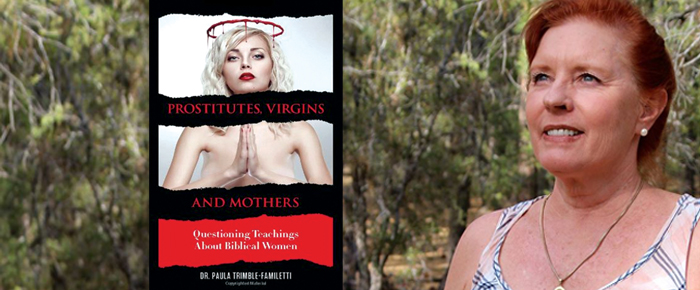
By Heidi Simmons
—–
Prostitutes, Virgins and Mothers
By Paula Trimble-Familetti
Non-Fiction
—–
It is amazing that a book written more than a thousand years ago about events that took place in a culture, time and place near the edge of recorded human history still dictates 21st century behavior.
In Paula Trimble-Familetti’s book Prostitutes, Virgins and Mothers: Questioning Teachings About Biblical Women, (Personhood Press, 218 pages) the author challenges the way women’s roles in scripture have been interpreted.
Trimble-Familetti writes that the Hebrew Bible cites a total of 1,426 names. Of that number, 1,315 are men and 111 are women. That’s only nine percent of the names mentioned.
With so few women represented, Trimble-Familetti focuses on those whose stories most impacted scripture. She looks at how the writers and editors of the Bible portray them.
Trimble-Familetti specifically centers her attention on the women who are in the genealogy and close circle of Jesus. These women are commonly considered prostitutes, virgins and mothers.
Using what could be considered a study-guide format, Trimble-Familetti notes all the scripture where each woman’s story is mentioned, along with a thumbnail understanding of her role. She then writes a first-person account from each woman’s point-of-view around the major events that shaped her character and ensured her place in Biblical history.
In each chapter, Trimble-Familetti follows-up the women’s specific stories with insightful observations from scholars and theologians. She looks at the text and scrutinizes the interpretation pointing out discrepancies and contradictions.
Refreshing these old stories, Trimble-Familetti captures the lives of Old and New Testament women and provides a context for their Biblical depiction. She considers not only the cultural setting, but also how the material was collected, reported and written.
Deciphering words and interpreting Aramaic, Hebrew or Greek translations, Trimble-Familetti reassesses the meaning of some passages. She breaks down the root language and shows that God is described with characteristics that are often feminine in nature, making the point that God is not solely masculine.
All the stories take place in a time when women were dominated, owned and/or oppressed by men. When these ancient oral stories became written, it was by men. When the editors put together the Bible over a thousand years ago, the misogyny continued as men decided what should be included. God become even more masculine.
Trimble-Familetti does not re-write these Bible stories, but instead re-examines them. In so doing, she delivers the significant contribution of each woman as she serves God despite male oppression and control.
Sarah, Abraham’s wife, was the first matriarch. Trimble-Familetti points out that Sarah was his wife as well as his half sister. A family tree is included and shows just how many women — mothers — went unnamed. It also sheds light on the story where Abraham turns Sarah over to the King of Egypt’s harem as his sister.
Although Mary Magdalene is commonly thought of as a prostitute, Trimble-Familetti shows that she was not. In fact, her role was of a beloved disciple and apostle of Jesus. It is Magdalene who first proclaims Christ as risen.
My favorite chapter is on Eve. Trimble-Familetti considered not including Eve’s story, but it offers a terrific insight into the catalyst of the male dominated world and the misunderstanding and misinterpretation of God.
Male authority, the lack of power and equality, impacts all the women’s stories. It is a patriarchal world and the women have little to no rights. But these prostitutes, virgins and mothers not only cope, they do all that is necessary to survive their male dominated existence. Their decisions and actions turn out to be crucial in bringing about the Messiah. That is one of Trimble-Familetti most notable points.
Trimble-Familetti writes with a gentle but passionate tone. Yet her approach is scholarly with footnotes and references. It is clear she cares about women and the issues that affect their lives. She wants women to see women in the Bible anew and to claim their own call to serve a God who cherishes and respects them.
Believing in self-examination and that God desires people to read, study and question scripture, Trimble-Familetti encourages Biblical literacy. She wants people to “read between the lines, fill in the blanks, and finish the unfinished stories.”
Prostitutes, Virgins and Mothers is an important and relevant narrative. Some of the problems that faced the women in the Bible are still a problem today. Male authority and dominance remain an issue especially in the Semitic fundamentalist religions. Women are still stoned to death and considered property. They still lack equality. And violence against women in the United States remains intolerably high.
Finally the beautiful message of Trimble-Familetti’s book is that hidden behind the male dominated language and perspective, is a God who is both feminine and masculine, who loves and respects men and women equally.
She says: “It is time to teach our daughters and our sons an understanding of religion and scripture which does not use the world view of the male writers of the last four thousand years or more to shape our current understanding of the goodness of God and the message of Jesus.”
No matter ones faith or the lack there of, our culture continues to be influenced by Biblical narrative. This book is much more than a faith based essay for women, it is liberating manifesto for both woman and men.
Trimble-Familetti has a Doctorate of Ministry in International Feminist Theology from San Francisco Theological Seminary. She earned her M. A. in Religion from Liberty University and her B.A. in Religion from Chapman University. She was raised a Protestant and became a Roman Catholic. She is now a member of an Independent Catholic Community.
She will be signing her award-winning book Prostitute, Virgins and Mothers Sunday, January 25, at 2:00 pm at the Pathfinder Community of the Risen Christ in Bermuda Dunes.









































